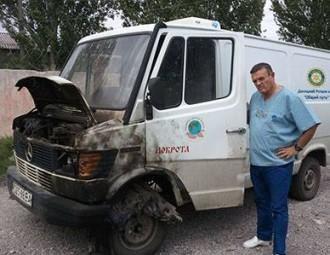Yakov Rogalin: We should combat evil in Ukraine with a chain reaction of kindness
 photo www.facebook.com/yakov.rogalin
photo www.facebook.com/yakov.rogalin
Under ongoing hostilities in the region, Donetsk Charitable Foundation “Dobrota” manages to accumulate aid to children and is sure that the evil reigning around can only be combated with good deeds.
The main problems and daily routine of this unique Donetsk NGO to “EuroBelarus” Information Service described its head MD Yakov Rogalin.
- How can you assess the situation in Donetsk and in Ukraine on the whole? Is it possible to reconsile the warring parties and what do average Donetsk citizens think about it?
- The situation in Ukraine can be defined as the “chain reaction of evil”, which means that it is no longer important who started what and who was right. What is important is making good deeds. As to the opposing sides, the so-called “average” Donetsk citizens are integral parts of this confrontation; they lost all their guides, they are absolutely indoctrinated.
I am convinced that we should combat evil in Ukraine with a chain reaction of kindness. In practice, we are to choose the topic, which would satisfy the two sides, so that people would understand how it feels to make something good, not evil. And we are to make good deeds as openly as possible; we should control it and report about it. This approach has worked out – we started receiving more and more donations.
- Did the sum of donations increase as well?
- It did. The sum of donations rose twice in one month. We already received about $17 thousand in July; and the amount of donations will only grow. Now we are promoting “Need for kindness”, where need means thirst similar to thirst for water. Now we are trying to make it a national Ukrainian project. We need a spark to ignite the flame, as we need to stop what is happening now. Ukraine once was a Christian country, and now dehumanization of enemy from the two sides is going on. Mass media from the one and from the other side aim at demonstrating that enemy deserves to die. How can we cool people’s ardor? Being a specialist in the sphere of charity, I asked for help from the Ukrainian regions; and they responded. But Russians are not far behind.
Thus, we demonstrated that chain reaction of kindness is principally possible. We only have to work on its strengthening. Moreover, let me confess – I don’t know any other way.
- What did Foundation “Dobrota” do earlier and what does it do now?
- Donetsk Charitable Foundation “Dobrota” (English “Kindness”) has been now developing charity for 16 years.
Truth is an enemy in any war, and we have to responsibly and conclusively state that our foundation only provides aid to civilian without any political, ethnical, or religious discrimination. In our situation the difference from the usual charity lies in absence of persons responsible for defining whom to help. We don’t work with political structures or biased organizations; we work exclusively with legal entities and individuals. This is our principle stance. Our final recipients are mostly bereaved Donbas children. We are working in accordance to these principles for 16 years, collecting donations to distribute them later.
In our work, we chose the partners who work with patients, people with disabilities, and refugees. Basically every day we receive letters of appeal from dozens of hospitals, asylums, boarding houses, and societies of the disabled.
- Do any difficulties appear with the so-called new authorities?
- This is the question that everyone is asking; but the foundation “Dobrota” has no such problem. During our 16-year work we didn’t bend under anyone, and it suits all. Our activity was approved but wasn’t supported; and it is the same now.
- Large Donetsk business is not up to this now…
- It is true; and that is why I had to introduce a social innovation, similar to fundraising, only I call it “friendraising”. It means that I turned to my friends, people, who know me and know what I do. These people have absolutely different political views, different ethnic origin, and different religious views. And it is very important that all these people agreed to donate money for children in hospitals, boarding houses, and asylums. To help them today means more than charity.
- More than a hundred donors have already responded to your appeal for aid…
- And these people form a Squad of Kindness, which already includes about two hundred people, who are already providing help. Of course, even though these people know me, they still ask questions; but there are no objections regarding the recipients of the help, i.e. children. And it doesn’t matter what family they have (if they do) and who their parents are. Something inside us is saying that it is good to help a bereaved child, that it is a good deed. And we are to cultivate it.
- Do you have to cooperate with other NGOs from Ukraine, Russia, Belarus, and other countries?
- I am a Rotarian, and that is why it were members of international Rotary Clubs who responded to my call for help first.
- How do other Donetsk NGOs survive now?
- This question should rather be addressed to these NGOs, as they are very few and very diverse.
- How can Belarusans help the foundation “Dobrota”?
- The easiest way to help is to use an electronic payment system (pressing the left button “пожертвовать” (donate) at our webpage in Russian). In a complicate situation donations can be made to my Privatbank card (No. 5168 7423 1142 6369). The sum of the donation can be symbolic, but it will be very meaningful for us as the sign of unquestionable support.
-
03.01
-
07.10
-
22.09
-
17.08
-
12.08
-
30.09



























